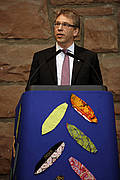Edinburgh 2010 opens with prayer, praise and reflection
Christian songs and hymns from around the globe mingled with the native skirl of bagpipes at welcoming ceremonies for Edinburgh 2010, a five-day conference marking the 100th anniversary of the World Missionary Conference of 1910. By the start of the conference, 297 registered delegates from 60 nations were joined by more than 100 additional visitors and staff on the Pollock Halls campus of Edinburgh University. John Bell, a leading musician from the Iona Community and editor of the Church of Scotland’s hymnal, provided continuity to sequences of greeting, reflection, Bible readings and prayer. He also introduced a diversity of musical styles from church communities in Europe, Africa, Asia, and the Americas.
Edinburgh 2010 takes as its theme “Witnessing to Christ Today” and welcomes Christians from a variety of church traditions: Protestant, Orthodox, Catholic, Anglican, Evangelical and Pentecostal. It is an occasion to review the history of faith over the past century and to look toward the future of world Christianity.
In opening remarks on Wednesday evening 2 June, the assembly heard from representatives of local sponsoring organisations: the University of Edinburgh, the Church of Scotland, Action of Churches Together in Scotland (ACTS), the Roman Catholic Church, the Scotland Evangelical Alliance as well as the general council of Edinburgh 2010.
During opening prayer on the following morning, reflections were offered by the leaders of two international sponsors of the conference: the World Council of Churches (WCC) and the World Evangelical Alliance (WEA).
The Rev. Dr Olav Fykse Tveit, general secretary of the WCC, affirmed that “mission and unity belong together. To be one in Christ is to witness together to Christ.” Discipleship, he said, demands the proclamation of Christ crucified and risen for human salvation: “This means that if there is to be a witness to Christ, there must be a mission movement of the cross. This means that if there is a will to be one in Christ, there must be an ecumenical movement of the cross. Nobody needs triumphalistic movements.”
Acknowledging and celebrating the diversity of his audience, Tveit continued: “It is important to keep a healthy dialectic and creative tension between the many dimensions of our calling. To witness to Christ is both evangelism and the prophetic stand for Christ’s will for justice, peace and care of creation.”
The Rev. Dr Geoff Tunnicliffe, international director of the WEA, warned that despite advances of the past century “there is no corner of the world where the mission of the church is complete. God’s calling to the whole church is to take the whole gospel to the whole world, and that call comes anew to us in every generation.” Some people have yet to hear the gospel of Christ, he explained, while in some other regions including Europe “re-evangelisation is desperately needed.”
Noting the promise of theological conversations among Evangelicals, Orthodox, Catholics and member churches of the WCC, Tunnicliffe admitted that “there have been many things that have divided the different streams of the church. We would be foolish to think in these few days all those often deeply-held and painfully fought-over differences could be resolved. But I hope that we can listen to one another with love and respect, build bridges rather than create chasms, pray together, learn together, discover new friendships.”

